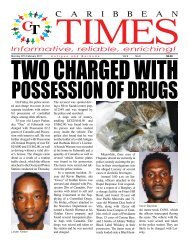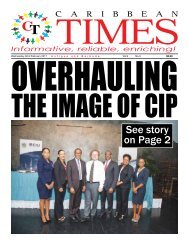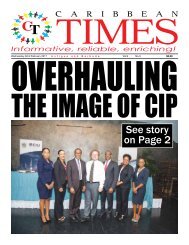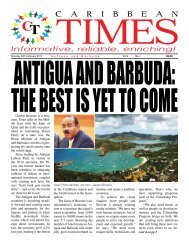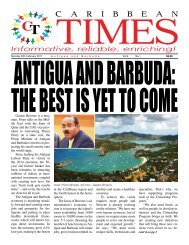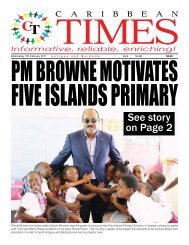Caribbean Times 65th Issue - Friday 5th August 2016
Caribbean Times 65th Issue - Friday 5th August 2016
Caribbean Times 65th Issue - Friday 5th August 2016
Create successful ePaper yourself
Turn your PDF publications into a flip-book with our unique Google optimized e-Paper software.
<strong>Friday</strong> <strong>5th</strong> <strong>August</strong> <strong>2016</strong> c a r i b b e a n t i m e s . a g 9<br />
cont’d from pg 8<br />
acy – in the way the country<br />
was treated by the IMF,<br />
including - and especially<br />
- not being granted any significant<br />
debt relief, through a<br />
debt write-down or a reduction<br />
in the sum of the debt,<br />
while having an austerity<br />
programme stuffed down its<br />
throat. But, he is realistic<br />
enough to say: Is any of this<br />
going to happen? Or will the<br />
IMF’s IEO report light up<br />
the sky fleetingly, to be forgotten<br />
soon? The omens are<br />
pointing to the latter”.<br />
Concern about the findings<br />
of the IEO report, particularly<br />
the obvious political<br />
interference in the IMF’s<br />
processes by the European<br />
Union and the European<br />
Central Bank, has evoked<br />
editorial comment from<br />
leading financial publications.<br />
For instance, the UK<br />
Financial <strong>Times</strong> newspaper<br />
editorialised on 28 July<br />
about “Europe’s outsized influence<br />
over the governance<br />
of the IMF” and expressed<br />
the view that such influence<br />
“must continue to decline<br />
if the institution is to retain<br />
credibility”.<br />
But, the reality is that<br />
recent reforms in the voting<br />
power of the IMF still leave<br />
the European governments<br />
with enormous and undeserved<br />
power. As the Financial<br />
<strong>Times</strong> observed, rather<br />
belatedly (and perhaps with<br />
an eye to yet another unthought-of<br />
consequence of<br />
Brexit): “The EU has also<br />
yet to demonstrate that it has<br />
abandoned the traditional<br />
stitch-up by which it, in effect,<br />
appoints the head of the<br />
IMF”.<br />
The United States of<br />
America (US) aids and abets<br />
the EU in its imposition of<br />
the IMF chief in return for<br />
the right to name the President<br />
of the World Bank. Between<br />
them, they operate a<br />
cabal of control of the international<br />
financial system.<br />
The IEO report is a valuable<br />
document. Developing<br />
countries, including those<br />
in the <strong>Caribbean</strong>, should not<br />
allow its findings “to run<br />
through our leaders’ fingers<br />
like thin, white sand” as the<br />
former Greek Finance Minister<br />
vividly put it.<br />
Instead, it should be used<br />
as a beacon to shine a bright<br />
light on the dark crannies of<br />
an organisation that was created<br />
to help countries out of<br />
dire fiscal straits, but whose<br />
prescriptions result in hurting<br />
more than it helps, except<br />
when the interests of its<br />
controllers are affected.<br />
At the World Bank/IMF<br />
meeting this autumn, the<br />
IEO report should be prominent<br />
among the items that<br />
Finance Ministers emphasize.<br />
It should become a<br />
tool for the re-examination<br />
of IMF policies and more<br />
considered discussion of the<br />
many governance issues,<br />
highlighted in the report and<br />
which, in the interests of all,<br />
have to be addressed effectively.<br />
Editor’s Note: The opinions<br />
expressed in this Op-ed<br />
are those of the author and<br />
do not necessarily reflect the<br />
views of <strong>Caribbean</strong> <strong>Times</strong>.





